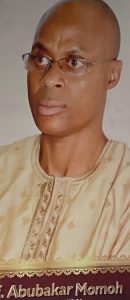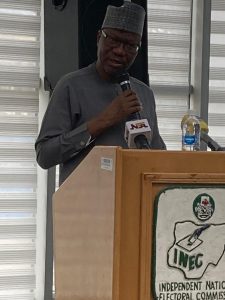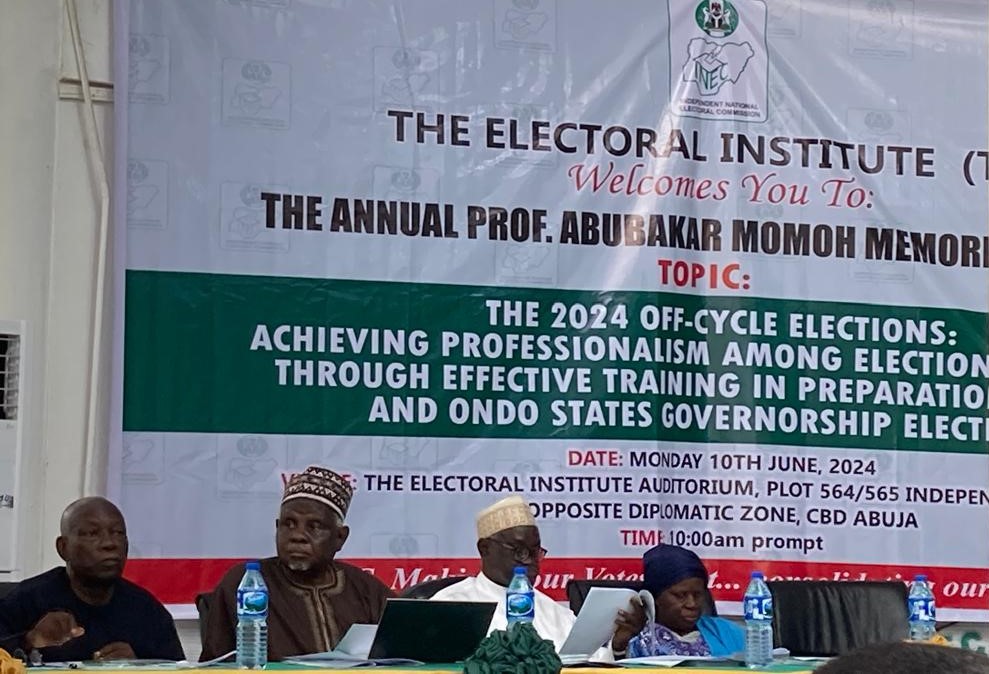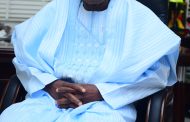Can election personnel be so well trained (in character and learning) that they can stand up to any moves compromising of qualitative conduct of elections in Nigeria? This is the puzzle Dr. Kole Shettima, Director, MacArthur Foundation, plunges into in this lecture in honor of Prof Abubakar Momoh organised by The Electoral Institute, June 10th, 2024. The lecture is on “Achieving Professionalism Among Election Personnel Through Effective Training in Preparation for the Edo and Ondo States Governorship Elections”. This is an abridged version of the lecture to the extent that footnotes have been edited out.
TEI asked me to speak on “Achieving Professionalism Among Election Personnel Through Effective Training in Preparation for the Edo and Ondo States Governorship Elections.” I understand the elections in Edo will be on Saturday, September 21st, 2024, and in Ondo on Saturday, November 16th, 2024.

The late Prof Abubakar Momoh
Significance of elections in a democracy
Elections are critical parts of every thriving democratic society. They serve as the process for choosing leaders in a democracy and must therefore guarantee and protect the rights of voters to choose. Since the first general elections in 1922, “Nigeria has had a history of perennial difficult and contentious elections attributable to weak institutions, including weak legal frameworks, poor political culture among both voters and politicians, lack of respect for rules, excessive use of money, especially to bribe voters and electoral agencies, as well as a zero-sum perception of electoral outcomes, which encourages a “win-at-all-costs” mentality among politicians.”[1] It is timely, therefore, for the Institute to convene today’s event to revisit the longstanding challenges of organizing elections in Nigeria.
Like in every democratic society, elections are contestations among stakeholders. In Nigeria, organizing elections is a complex exercise involving a web of public institutions, agencies, and officials. It is further complicated by the unstable rules of the game, multiple institutional weaknesses, and an environment of widespread lack of trust and integrity which imposes significant financial and ethical costs on elections planning in Nigeria.
Electoral officers and elections planning and management
Today’s topic is focused on the role of elections personnel. From the outset, I would like to emphasize that elections personnel are only a small microcosm of the human and physical infrastructures needed to achieve a transparent and credible elections. So, while I hope that the conversations today, would land us on important ideas for improving the role and effectiveness of elections personnel in elections in Nigeria, I hope the Commission, TEI and civil society organizations will continue to lead the debate and discussions to tackle other critical factors and determinants of free, fair, and credible elections in Nigeria.
INEC categorizes electoral officials as permanent and ad-hoc staff of the Commission who handle and supervise elections. Electoral ad-hoc staff are temporary personnel explicitly hired for the period of an electoral process to help with election administration and conduct. Ad-hoc staff are, thus, an essential group for electoral conduct. They often comprise university students, NYSC, lecturers, civil servants, and members of the public who meet specific eligibility requirements.
Ad hoc personnel are critical to handling the electoral process. Their responsibilities frequently include registration of voters, assistance in conveying electoral materials to and from polling units, overseeing the voting process and vote counting, and transmitting election results, among others. They are tasked with ensuring that the voting process is completed efficiently and transparently during the election and that voter registration is done smoothly during the Continuous Voter Registration. By providing this vital support, electoral ad hoc professionals contribute to the integrity and credibility of the electoral process.
Although INEC has its staff, the reliance on ad hoc staff for assistance in electoral conduct stems mainly from the enormity of human resources required to conduct elections. For Nigeria, there are 36 states, 774 local government areas, 8,809 wards or Registration Areas, and 176,846 Polling Units (PUs). In each PU, at least four electoral personnel are required to conduct an election. These include the Presiding Officer, Assistant Presiding Officer I, Assistant Presiding Officer II, and Assistant Presiding Officer III. Taken together, at minimum, the number of ad hoc staff required is 707,834 personnel, just at the PU level. The Commission also engages the services of Supervising Presiding Officers (SPOs), Registration Area Technicians (RAC Techs), and Collation Officers to aid in the conduct of elections. These ad hoc are thus very important in the electoral process, governance, and, by extension, democracy. According to INEC’s 2023 Elections Report, the Commission aimed to and trained over a million ad-hoc staff nationwide. Comparatively the elections in Edo and Ondo States are smaller: Edo has 4,519 PUs and 192 RAs while Ondo has 3,933 PAs and 203 RAs.
Election personnel are to INEC, the everyday roadblock constable to the police and the country. Like lower-level police in the remotest part of Nigeria, election personnel and especially ad hoc staff are also found in every polling unit. There were 176,606 polling units during the 2023 elections. The impression created by the police in my village influences the perception of the police and the country. Similarly, the election staff deployed on an election day is the first point of contact for the electorate, the media, and international and domestic monitors and observers. The impression created by them influences the perception of the elections.
What I am trying to illustrate is put more elegantly by INEC: “Election officials have a major role in the electoral process. The manners in which they discharge their duties affect the degree of confidence voters have in the electoral process and in INEC”. Hence, “all the actions of election officials should be characterized by the highest standards of integrity, impartiality, transparency, professionalism, gender sensitivity and support for the elderly and those who are physically challenged.” In pursuit of these lofty ideas, INEC set up The Electoral Institute, whose mission and vision include electoral personnel of global standard. These sentiments are reinforced in INEC’s strategic plan for 2022 to 2026. What is inspiring about the Institute’s mission is the link between its role and delivery of good governance. The Institute rightly identify the condition for good governance lies in the conduct of elections, and it plays a pivotal role in laying the foundation.
The Challenges of Electoral Personnel
The 2023 general election was probably the best prepared. Six indicators to back my claim:
- The 2022 Electoral Act: progressive provisions
- Increased access to polling units: 47% increase compared with the beginning of the 4th republic.
- Deployment of Technology: IREV, BVAS, E-School, Online Registration Portal, Voter Enrolment Device, and Media Accreditation Portal among others. The IREV was also the most disappointing issue during the elections.
- New forms of training: The Institute launched the INEC e-School and Training BOT to train ad hoc staff, including presiding officers and their assistants, supervisory presiding officers, coalition officers, and returning officers.
- Greater engagement with stakeholders: more regular meetings with civil society, political parties, religious and traditional leaders, and other interested groups
- Better inclusion: institutional reform with the Department of Gender and Social Inclusion, assistive devices for people with disability, and more attention to pregnant women, new mothers, and senior citizens.
With the benefit of hindsight, we know for sure now that training election personnel is not the silver bullet to fix the litany of challenges ailing elections planning and management in Nigeria. Although the leadership appear to have learned and built on the previous general elections, I sincerely hope that lessons from the 2023 elections can be harvested to improve further. I have confidence based on the reforms since 2010 that INEC is poised to be a learning institution. I am optimistic that the efficient planning and management of elections will continue to be prioritized and institutionalized by the current leadership and beyond.
Despite the best of plans, such as in 2023, there were many challenges with the recruitment, deployment, and practice of election personnel, as illustrated in the reports of domestic and international observers and monitors and the INEC report of the 2023 elections. According to the INEC 2023 review of the general election, “Electoral staff recruitment, training, deployment, and remuneration remained challenged throughout the plan and could rightly be termed a recurring one. The number of ad-hoc staff required to conduct electoral exercises, especially General Elections, is enormous, leaving the Commission constantly dependent on other agencies. The shortlist of such persons is often not presented promptly for effective training. Training for election duty, which takes place over a shorter and inadequate timeline, often lacks basic materials, and takes place in an unconducive classroom environment in some instances. Consequently, some deployed staff from such crashed cascade training exhibit poor technical and process skills in their roles and responsibilities on Election Day. In addition, there were reports of alleged substitution of trained staff before commencement of elections, which further compounded the situation.”
To commemorate the 2023 International Democracy Day, the MacArthur Foundation supported the

Dr. Kole Shettima
Electoral Hub, a project of the Initiative for Research, Innovation, and Advocacy in Development led by Princess Hamman-Obels and the Madiba Foundation for Good Governance led by Olumide Fred Adetiba to organize an Ad-hoc Staff Experience Sharing Roundtable on Friday, September 15th, 2023. The participants were diverse in age, gender, geographical location, and level of education. A summary of the challenges raised at the Roundtable were the recruitment of underqualified personnel, inadequate training, late activation of RACs, inadequate remuneration, inadequate security, and technological failure. Other challenges stemmed from inadequate support infrastructure and reverse logistics.
Addressing the abstract – character and trust challenge
The challenges discussed so far can be classified as competence and environmental. But the more difficult has to do with character. Electoral officials, their families, friends, and communities come under tremendous pressure during elections. As Professor Ibeanu stated, “In fact, I still marvel that each time I go online and the things I read about myself, I can hardly sometimes recognize myself. I am described as an incompetent thief and all sorts. It is quite interesting that you start wondering if this is really the person they are describing. It requires a lot of courage to start from. And this is from sitting in the air-conditioned offices in Abuja. Now, imagine what young people standing before very powerful politicians and being pressured to do the wrong things would have to go through.” He further said, “If you are an electoral official and you have the tendency to hobnob with politicians, try to live a lifestyle of rockstars and demean yourself in so many ways, politicians would take advantage. They will come in and offer you what you want. The worst experience anybody can go through is to be friends with politicians because they do not have friends. They only have interest in how to win elections.”
The transition from training and actual conduct of election personnel presents a conundrum to every interested person in elections planning and management in Nigeria. In an environment of widespread distrust and suspicion fueled by ethnic, religious, and socio-economic polarizations, how can INEC and its partners involved in elections planning insulate elections officials from the pressures around them? It appears that the current planning milieu emphasizes competency above character considerations. Is it right to assume that training alone will improve the quality of elections and the role of elections officers in an election? As we countdown to the off-cycle elections in Edo and Ondo states, what more can TEI do to shore up the impact of training for electoral officials and prevent character failures in the upcoming elections?
Recommendations
From the diagnosis of the 2023 by INEC and the roundtable on ad hoc staff by The Electoral Hub and the Madiba Foundation on Good Governance, I make a few recommendations:
Training and Coordination
- Revamp the curricula of training of election officials to include civic duties, the history of elections, democracy, integrity and accountability of election officials, the role of INEC, credible elections, among others, in addition to the technical processes and procedures.
- Are there too many documents election officials are trained on and produced for our elections? I understand there are 20 plus forms filled for elections. Can automation help to also reduce cost of elections, contribute to environmental health and increase efficiency in the electoral process?
- Physical screening should be conducted before ad-hoc staff are recruited and deployed. This will present a more robust check against the recruitment and deployment of unqualified persons. It is advised to recruit in partnership with institutions instead of recruit as individuals.
- Ensure that recruited personnel possess the requisite educational qualifications. This will address challenges with a poor understanding of the electoral process and duties by ad-hoc staff.
- The pre- and post-screening test with a recommended pass rate should be administered to ensure that recruits for ad-hoc staff duty understand their duties and responsibilities adequately.
- Registration Area Centers should be opened early, and adequate security should be provided to protect sensitive and non-sensitive electoral materials and electoral staff.
- Registration Area Centers should be made habitable. Adequate facilities, including lighting, mattresses, convenience, etc., should be provided at RACs.
- Adequate provisions for logistics should be provided. This should include logistics considerations that address the needs of physically challenged pregnant women, new mothers, and senior citizens.
- We should put mechanisms for assessing the quality of training of the Institute.
Accountability and Upliftment
- All electoral staff, including ad-hoc staff, should be required to declare any conflict of interest before deployment on election duties.
- All malpractices and breaches of the electoral process, either by permanent or ad-hoc staff, politicians, security agents, and electorates, should be punished per the legal provisions. I am not sure where is the conversation on the electoral offences commission.
- The Institute should keep a record of ad hoc staff who performed poorly or of accused of compromising elections.
- Election officials found above board should be uplifted, commended, and recognized publicly. The Federal Government should include election officials in its national honors while INEC should institute a system of recognition for outstanding officials. I recall the excitement when women election leaders were celebrated by IRIAD as part of the activities on International Women’s Day, 2024. The National Youth Service Corp may factor the role of its members in elections in honoring outstanding members. We can celebrate S/heroes of democracy On Democracy Day.
Security
- INEC should establish a direct link with security persons posted to the various polling units. Information about the full deployment of security agents, including PU posted for electoral duty, should be available to INEC.
- Security should be treated as a collective responsibility. Security agencies, civil society actors, ad-hoc staff, voters, and all other stakeholders in the electoral process should take steps towards protecting electoral materials and personnel.
Innovation
- The use of video and audio instruction materials is highly commendable in improving the competence of election officials understanding of the election process, their roles, responsibilities, and duties. The Institute may consider challenging young people to develop ideas on how to improve the conduct of training and elections.
- Explore recruiting volunteers from professional associations (medical doctors, nurses, accountants, lawyers, veterans, red crescent/cross) to serve as ad hoc staff. Two advantages: it will reduce the cost of elections and increase public ownership and trust.
- Increased transparency in the appointment of the Commissioners, national and resident will have salutary effect on the electoral process.
- Build a pipeline of civically minded young people from secondary schools, universities, boys scout, and girls brigade among others. For example, consider an MOU with the National Universities Commission, National Board for Technical Education and National Commission for Colleges of Education to introduce General Studies Program on elections.
- Establish a longer relationship with ad hoc election officers such as sending thank you notes, maintaining a data base, and request for feedback on their experience among others.
Conclusion
I want to conclude with a tribute to election officials. They make indispensable contributions and often underappreciated personal sacrifices and difficulties in undertaking the critical task of overseeing elections in the country. Many have lost their lives, properties, dignity, and well-being. They are traumatized by the electoral experiences. INEC documented that “on election day, security agencies, traditional and social media reported violent attacks on polling units, as well as intimidation and harassment of voters and polling staff by thugs in 21 states, resulting in some 21 fatalities.” I can only imagine the state of mind of members of the Commission and especially the Chair during the 2011 presidential election when we lost more than 800 citizens due to violence or that of the Commission and especially the Chair when IREV failed to deliver on the presidential elections. What about the young people in Bayelsa who were escorted with gunboats to conduct elections or the young women in Gombe sexually assaulted on the eve of the 2023 general elections? One recommendation I want to make is for INEC to establish wellness centers to respond to its physical, mental, and psychological needs.
We at the Institute have significant responsibilities in preparing for the Edo and Ondo elections and beyond. We are equipped to handle the challenges arising from technical processes and procedures and can influence the environment. However, the more significant challenge is character. We may not have the tools to handle the challenges arising from character. Let me put the issue differently. INEC replaced an incompetent returning officer in Sokoto State when he couldn’t declare national assembly elections. The challenge was purely competence. However, what can INEC do when election officers are bought by dubious politicians? The challenge is of character.




























